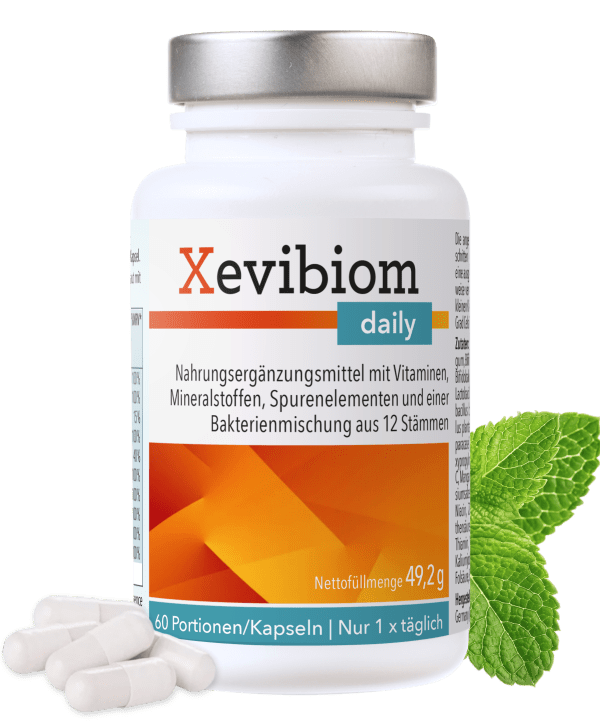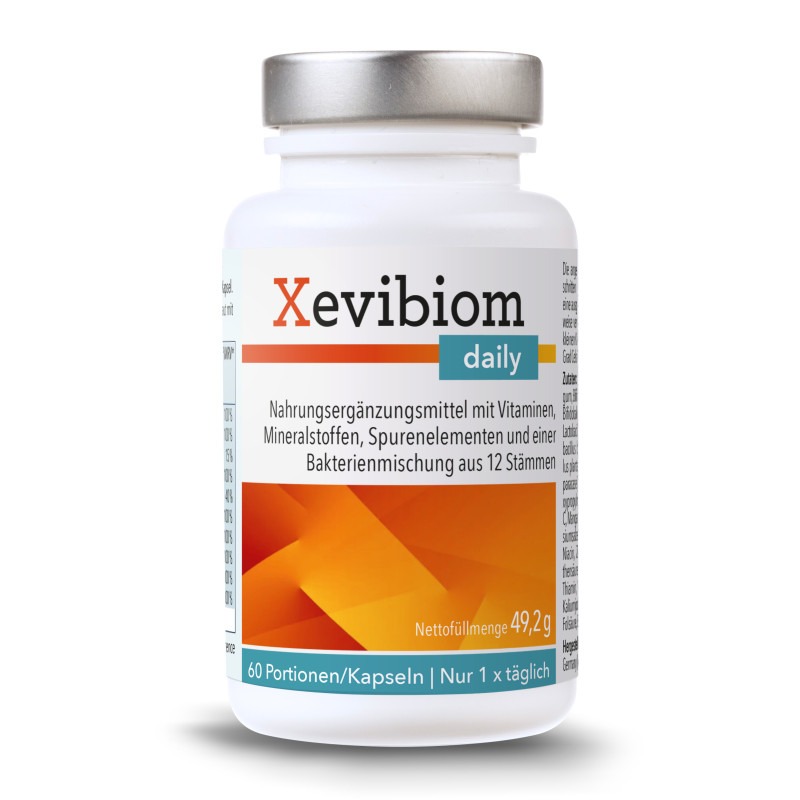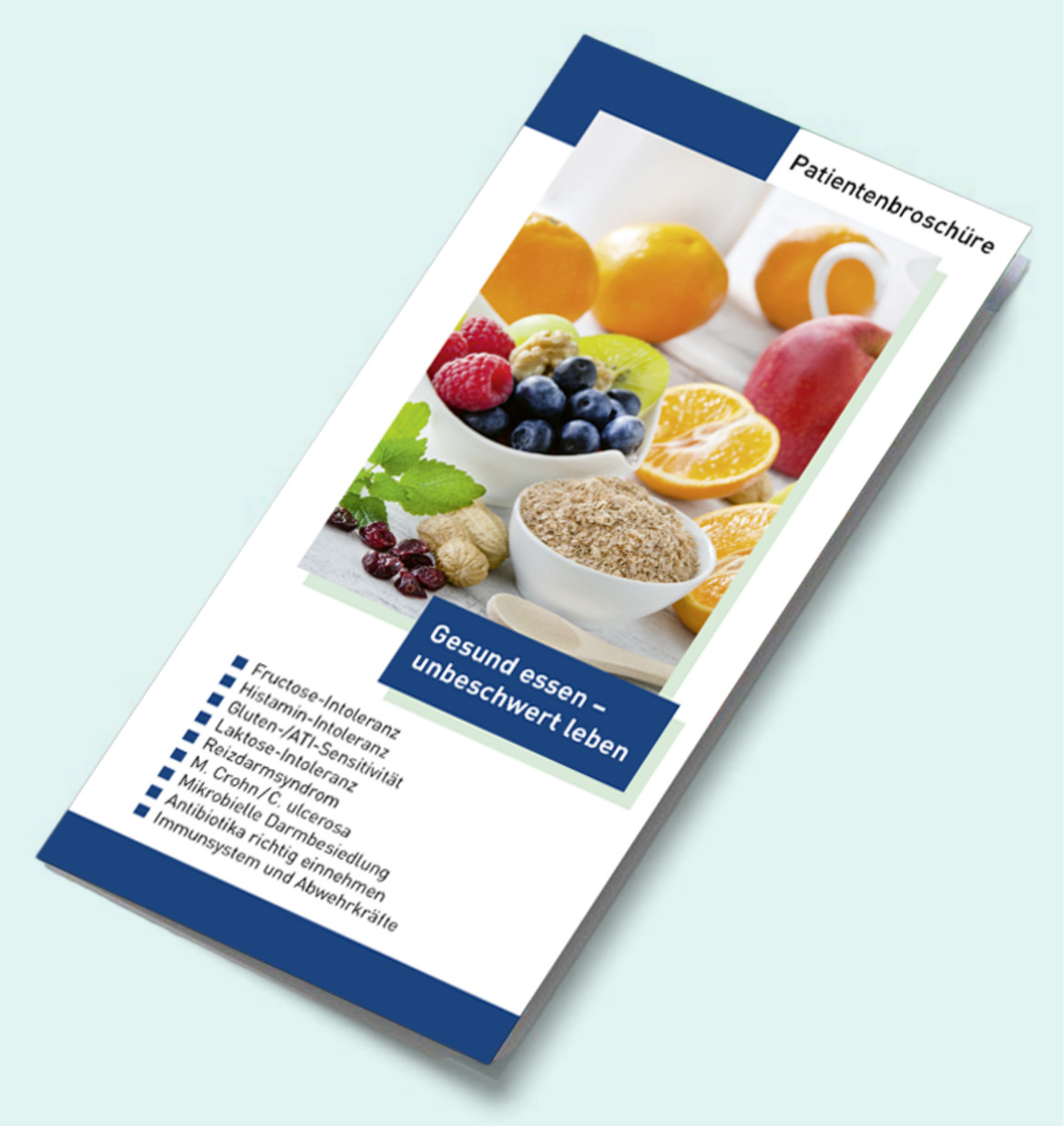All-in-one Formel 12 + 21
Xevibiom© daily
Für eine probiotische Darmflora und ein starkes Immunsystem*
Direkt bestellen
25 Jahre
Erfahrung
Geprüfte
Formulierung
Sichere
Inhaltsstoffe
100 %
vegan
Frei von Laktose, Fructose
Farb- und Konservierungsstoffen
Wissenschaftliche
Grundlagen
In Deutschland
hergestellt
Xevibiom© daily liefert täglich 12 wichtige Stämme probiotischer Lebendkulturen und unterstützt mit 21 lebenswichtigen Nährstoffen die Versorgung Ihrer Körpersysteme*:
Geeignet bei Fructose-, Laktose-,
Histamin- und Glutenintoleranz

Sie wollen Ihren Körper jeden Tag auf mehreren Ebenen rundum gut versorgen? Dann ist Xevibiom© daily genau das Richtige für Sie! Seine einzigartige Formel kombiniert probiotische Bakterienkulturen mit Vitaminen, Mineralstoffen und Spurenelementen in einer einzigen Kapsel für eine optimale Darmgesundheit und tägliche Nährstoffversorgung.
Mit nur einer Kapsel am Tag versorgen Sie Ihren Darm mit nützlichen Bakterien, die die Verdauung unterstützen und das Immunsystem stärken. Gleichzeitig liefert Xevibiom© daily Ihnen alle wichtigen Vitamine und eine Vielzahl weiterer Nährstoffe, die Ihr Körper täglich benötigt. So sparen Sie Zeit und Geld, denn Xevibiom© daily ist das erste und einzige Kombipräparat auf dem Markt, das probiotische Kulturen und essenzielle Nährstoffe in dieser Form in einer Kapsel vereint.
Xevibiom daily – für einen starken Darm und eine optimale Nährstoffversorgung, jeden Tag!
Lesen Sie mehrDarmbakterien, auch bekannt als Probiotika, spielen eine wichtige Rolle für unsere Gesundheit.
Die Aufgaben der Darmbakterien sind u.a.:
Eine Vielzahl von Darmbakterien wurden identifiziert, die allesamt eine Menge von gesundheitlichen Vorteilen bieten. Zu den prominentesten gehören Bifidobakterium longum, Bifidobakterium breve, Bifidobakterium lactis, Bifidobakterium bifidum, Bifidobakterium infantis, Lactobacillus rhamnosus, Lactococcus lactis, Lactobacillus bulgaricus, Lactobacillus casei, Lactobacillus plantarum, Lactobacillus salivarus und Lactobacillus paracasei. Sie alle sind in jeder Kapsel von Xevibiom© daily enthalten.
Darmbakterien können dabei helfen, Verdauungsbeschwerden zu lindern, das Risiko von Allergien zu reduzieren, die Aufnahme von Nährstoffen zu verbessern, die Auswirkungen von Antibiotika auf die Darmflora zu minimieren und sogar entzündliche Erkrankungen zu bekämpfen.
Es ist wichtig, eine gesunde Darmflora aufrechtzuerhalten, indem man Probiotika entweder in Form von Nahrungsergänzungsmitteln oder probiotischen Lebensmitteln wie Joghurt, Sauerkraut, Kefir oder Kimchi konsumiert. Auf diese Weise kann man von den zahlreichen gesundheitlichen Vorteilen dieser kleinen, aber mächtigen Darmbakterien profitieren.
Xevibiom© daily enthält eine Bakterienmischung aus 12 der prominentesten Stämme in einer hohen Konzentration von 6,0 Milliarden Kolonie-bildenden Einheiten (KbE) pro Tag.
Stoffwechsel
Als Makronährstoffe bezeichnet man alle Nährstoffe, die Energie liefern. Dies sind Kohlenhydrate, Fette und Proteine. Sie werden durch die Nahrung aufgenommen und mittels Stoffwechsel dem Körper zur Verfügung gestellt. Xevibiom© daily enthält die Nährstoffe Chrom Zink, Eisen und Jod.
Die Europäische Behörde für Lebensmittelsicherheit (EFSA) stellt zu diesen Stoffen fest: Chrom und Zink tragen zu einem normalen Stoffwechsel von Makronährstoffen bei. Eisen und Jod tragen zu einem normalen Energiestoffwechsel bei. Zink trägt zu einem normalen Kohlenhydrat-Stoffwechsel bei.
Funktionierende Abwehrkräfte
Starten Sie Ihren Tag mit einem gut funktionierenden Immunsystem. Eine gesunde und ausgewogene Ernährung ist der Schlüssel dazu. Hierbei unterstützt Sie Xevibiom© daily mit vielen seiner Zutaten. Die Europäische Behörde für Lebensmittelsicherheit (EFSA) stellt fest: Kupfer, Eisen, Selen, Vitamin A, B12, B6, C, D und Zink tragen zu einer normalen Funktion Ihres Immunsystems bei.
Oft müde und erschöpft?
Selbst die aktivsten Menschen fühlen sich gelegentlich energielos. Doch es gibt Möglichkeiten, Müdigkeit und Ermüdung zu reduzieren und mit positiver Energie den Alltag zu bewältigen. Eine ausgewogene Ernährung hilft dabei, den Körper mit Energie zu versorgen. Hierbei unterstützt Sie Xevibiom© daily . Die Europäische Behörde für Lebensmittelsicherheit (EFSA) befindet: Eisen, Magnesium, Niacin, B2, B12, B6 und Vitamin C tragen dazu bei, Müdigkeit und Ermüdung zu reduzieren.
Psychische und kognitive Funktionen
Psychische und kognitive Funktionen spielen eine wichtige Rolle in unserem Alltag. Sie betreffen verschiedene Aspekte des Denkens, des Gedächtnisses und der Problemlösung. Auch in vielen Berufen werden diese Fähigkeiten benötigt.
Bei alldem unterstützt Sie Xevibiom© daily mit seinen hochwertigen Nährstoffen für eine normal funktionierende Psyche. Die Europäische Behörde für Lebensmittelsicherheit (EFSA) stellt fest: Vitamin B3, B6, B12 sowie Magnesium tragen zu einer normalen psychischen Funktion bei.
Starkes Nervensystem
Das Nervensystem spielt eine lebenswichtige Rolle und ist zugleich äußerst empfindlich. Es bedarf der Unterstützung durch Biotin, Kupfer, Magnesium, Niacin und den Vitaminen B2, B12 sowie B6, die wir täglich mit einer ausgewogenen Ernährung aufnehmen.
Unsere Nahrung liefert essenzielle Nährstoffe für die normale Funktion des Nervensystem. Dabei unterstützt sie Xevibiom© daily mit seinen wichtigen Nährstoffen für das Nervensystem.
Die Europäische Behörde für Lebensmittelsicherheit (EFSA) stellt fest: Biotin, Kupfer, Magnesium, Niacin, Vitamin B2, B6 und B12 tragen zu einer normalen Funktion des Nervensystems und zu einem normalen Energiestoffwechsel bei.
Haut, Haare & Nägel
Schönheit beginnt im Inneren. Die in Xevibiom© daily enthaltenen Substanzen Biotin, Kupfer, Selen, Zink, Jod, Niacin, sowie die Vitamine B2, A und C unterstützen Sie dabei, denn diese Nährstoffe spielen eine wesentliche Rolle für das Wachstum von Haaren, Nägeln und Haut.
Die Europäische Behörde für Lebensmittelsicherheit (EFSA) fasst die Funktionen dieser Nährstoffe wie folgt zusammen:
Knochen, Muskeln und Zähne
Unabhängig davon, ob Sie sich von einer Verletzung erholen oder einfach nur Ihre Kraft erhalten möchten, ist es sinnvoll, sowohl Knochen als auch Muskeln durch geeignete Maßnahmen zu stärken. Hierzu zählt auch eine ausgewogene und abwechslungsreiche Ernährung. Bei Ihrer Nährstoffversorgung unterstützt Sie Xevibiom© daily jeden Tag.
Auch gesunde Zähne erhalten wir mit unserer Ernährung. Wer langfristig seine Zahngesundheit erhalten möchte, sollte darauf achten, eine abwechslungsreiche Ernährung zu haben, die reich an Vitaminen, Mineralstoffen und Spurenelementen ist. Auch hierbei unterstützt Sie Xevibiom© daily.
Die Europäische Behörde für Lebensmittelsicherheit (EFSA) fasst die Funktionen der in Xevibiom© daily enthaltenen Nährstoffe wie folgt zusammen:
Sehkraft
Der Erhalt gesunder Augen und starker Sehkraft wird auch durch eine ausgewogene Ernährung mit den richtigen Nährstoffen beeinflusst. Xevibiom© daily unterstützt Sie bei der Versorgung mit diesen Nährstoffen. Es enthält Zink und Vitamin A.
Gemäß der Europäische Behörde für Lebensmittelsicherheit (EFSA) tragen Zink und Vitamin A zur Erhaltung normaler Sehkraft bei. Vitamin A trägt außerdem zur Erhaltung normaler Schleimhäute bei, zu denen auch die Bindehaut des Auges zählt.
Reproduktive Gesundheit
Erfüllt sich ein langersehnter Kinderwunsch nicht, dann können mehrere Faktoren eine Rolle spielen. Hierzu gehört auch die richtige Nährstoffversorgung mittels einer ausgewogenen Ernährung. Hierbei unterstützt Sie Xevibiom© daily mit Zink und Folsäure.
Die Europäische Behörde für Lebensmittelsicherheit (EFSA) sagt dazu: Zink trägt zu einer normalen Fruchtbarkeit und einer normalen Reproduktion bei. Folsäure trägt zum Wachstum des mütterlichen Gewebes während der Schwangerschaft bei.
Zink trägt auch zur Erhaltung eines normalen Testosteronspiegels im Blut bei.
Die einzigartige Rezeptur von Xevibiom© daily vereint die Versorgung des Immunorgans Darm mit probiotischen Kulturen mit einer Rundum-Nährstoffversorgung mit Vitaminen, Mineralstoffen und Spurenelementen. Und das jeden Tag.
Fühlen Sie sich rundum gut versorgt mit Xevibiom© daily, der täglichen All-in-One Lösung für Jung und Alt.
Xevibiom© daily enthält keinerlei Laktose, Fructose, Histamin, Gluten, Sorbit, Hefe, Gelatine, Konservierungsstoffe, Bindemittel oder Süßstoffe. Es ist auch frei von Schellack und gehärteten Fetten sowie Eiweiß- und Aromastoffen sowie Farbstoffen und vielen weiteren Zusätzen und eignet sich somit hervorragend auch bei Nahrungsmittel-Unverträglichkeiten wie z. B. Fructoseintoleranz, Histaminintoleranz oder auch Glutensensitivität.
Xevibiom© daily
60 Kapseln
Ab sofort erhältlich in unserem bauchvital Onlineshop
**direkt beim Hersteller

1-mal täglich eine Kapsel unzerkaut mit ausreichend Flüssigkeit zu den Mahlzeiten einnehmen.

PZN: 19415749
Nettofüllmenge 60 Kapseln = 49,2g
Die angegebene empfohlene tägliche Verzehrmenge darf nicht überschritten werden. Nahrungsergänzungsmittel sollten nicht als Ersatz für eine ausgewogene, abwechslungsreiche Ernährung und gesunde Lebensweise verwendet werden. Für Kinder und Jugendliche unter 17 Jahren nicht geeignet.
Das Produkt ist außerhalb der Reichweite von kleinen Kindern aufzubewahren. Bitte lagern Sie das Produkt trocken, lichtgeschützt und nicht über 25 Grad Celsius.
Nahrungsergänzungsmittel mit einer Bakterienmischung sowie Vitaminen, Mineralstoffen und Spurenelementen
Bakterienmischung (Bifidobakterium longum, Bifidobakterium breve, Bifidobakterium lactis, Bifidobakterium bifidum, Bifidobakterium infantis, Lactobacillus rhamnosus, Lactococcus lactis, Lactobacillus bulgaricus, Lactobacillus casei, Lactobacillus plantarum, Lactobacillus salivarus, Lactobacillus paracasei), Magnesiumoxid, Überzugsmittel Hydroxypropylmethylcellulose, Eisenbisglycinat, L-Ascorbinsäure, Mangangluconat, DL-alpha-Tocopherylacetat, Trennmittel (Magnesiumsalze der Speisefettsäuren, Siliciumdioxid), Nicotinamid, Zinkbisglycinat, Kupferbisglycinat, D-Calcium Pantothenat, Farbstoff (Calciumcarbonat), Riboflavin, Thiaminmononitrat, Retinylacetat, Pyridoxinhydrochlorid, Chrompicolinat, Kaliumiodid, L-Selenomethionin, Menachinon-7, Pteroylmonoglutaminsäure,D-Biotin, Cholecalciferol, Cyanocobalamin
| Vitamin A | 800 µg (100 % NRV*) | Biotin | 50 µg (100 % NRV*) | Bifidibakterium breve | (500 Mio KbE./Kps.) |
| Vitamin D | 5,0 µg (100 % NRV*) | Vitamin B5 | 6,0 mg (100 % NRV*) | Bifidobakterium lactis | (500 Mio KbE./Kps.) |
| Vitamin E | 12 mg (100 % NRV*) | Magnesium | 57,0 mg (15 % NRV*) | Bifidobakterium bifidum | (500 Mio KbE./Kps.) |
| Vitamin K | 75 µg (100 % NRV*) | Eisen | 14 mg (100 % NRV*) | Bifidobakterium infantis | (500 Mio KbE./Kps.) |
| Vitamin C | 40mg (50 % NRV*) | Zink | 4,0 mg (40 % NRV*) | Lactobacillus rhamnosus | (500 Mio KbE./Kps.) |
| Thiamin | 1,1 mg (100 % NRV*) | Kupfer | 1,0 mg (100 % NRV*) | Lactobacillus lactis | (500 Mio KbE./Kps.) |
| Riboflavin | 1,4 mg (100 % NRV*) | Mangan | 2,0 mg (100 % NRV*) | Lactobacillus bulgaricus | (500 Mio KbE./Kps.) |
| Niacin | 16 mg (100 % NRV*) | Selen | 55 µg (100 % NRV*) | Lactobacillus casei | (500 Mio KbE./Kps.) |
| Vitamin B6 | 0,7 mg (50 % NRV*) | Chrom | 40 µg (100 % NRV*) | Lactobacillus plantarum | (500 Mio KbE./Kps.) |
| Folsäure | 60,0 ¬µg (30 % NRV*) | Jod | 150 ¬µg (100 % NRV*) | Lactobacillus salivarus | (500 Mio KbE./Kps.) |
| Vitamin B12 | 2,5 µg (100 % NRV*) | Bifidobakterium longum | (500 Mio KbE./Kps.) | Lactobacillus paracasei | (500 Mio KbE./Kps.) |
*Prozentsatz der Nährstoffbezugswerte (Nutrient Reference Values) nach Verordnung (EU) Nr. 1169/2011.
1. Neumann C, Cantagrel A, Roussel M, et al., Immune-Modulation by the Human Gut Microbiota: The Effect of Diversity and Composition on Immune Phenotype. Inflammatory Bowel Diseases. 2020;26(1):1-13.
2. Schwartz M, Singh R, Tien P., Microbiome and Skin Diseases. Microorganisms. 2019;7 (11):550.
3. Belkaid Y, Naik S., Compartmentalized and Systemic Control of Tissue Immunity by Commensals. Nature Immunology. 2013;14(7):646-653.
4. Wlodarska M, Kostic A, Xavier R., An Integrative View of Microbiome-Host Interactions in Inflammatory Bowel Diseases. Cell Host & Microbe. 2015;17 (5):577-591.
5. Thomas S, Izard J, Walsh E, et al., The Host Microbiome Regulates and Maintains Human Health: A Primer and Perspective for Non-Microbiologists. Cancer Research. 2017;77 (8):1783-1812.
6. Hopkins M, Sharp R., Macfarlane G. Age and Disease Related Changes in Intestinal Bacterial Populations Assessed by Cell Culture, 165 RNA Abundance, and Community Cellular Fatty Acid Profiles. 2001;48(2):198-205.
7. Bhattarai Y, Schmidt B., Towards an Understanding of the Mechanism of Probiotics. Current Microbiology. 2018;208(2):99-106.
8. Cho I, Blaser M. The Human Microbiome: At the Interface of Health and Disease. Nature Reviews Genetics. 2012;13(4):260-270.
9. Arrieta M, Madsen K., Extraintestinal Effects of the Gut. Microbiome: Bacterial Translocation and Immunomodulation. Journal of Pediatric Gastroenterology and Nutrition. 2016;63 (4):12-e22.
10. Gong H, Sakurai R, Tanaka Y, et al., Microbiota and Chronic Asthma: A Community Study in a Southern Japanese Island. Allergy. 2016;71(2):205-214.
11. Tremaroli V, Bäckhed F., Functional Interactions between the Gut Microbiota and Host Metabolism. Nature.
* Kupfer, Eisen, Selen, Vitamin A, B12, B6, C, D und Zink tragen zu einer normalen Funktion Ihres Immunsystems bei. Eisen, Magnesium, Niacin, B2, B12, B6 und Vitamin C tragen dazu bei, Müdigkeit und Ermüdung zu reduzieren. Vitamin B3, B6, B12 sowie Magnesium tragen zu einer normalen psychische Funktion bei. Biotin, Kupfer, Magnesium, Niacin, Vitamin B2, B6 und B12 tragen zu einer normalen Funktion des Nervensystems und zu einem normalen Energiestoffwechsel bei. Biotin, Zink, Jod, Niacin, Vitamin B2 und A tragen bei zur Erhaltung normaler Haut. Biotin, Selen, Zink tragen bei zur Erhaltung normaler Haare. Kupfer, Selen, Zink, Vitamin B2 und Vitamin C tragen dazu bei, die Zellen vor oxidativem Stress zu schützen. Kupfer trägt bei zu einer normalen Haarpigmentierung, zur Erhaltung von normalem Bindegewebe und zu einer normalen Hautpigmentierung. Selen und Zink tragen zur Erhaltung normaler Nägel bei. Kalzium, Magnesium und Vitamin D tragen zur Erhaltung normaler Muskelfunktionen, normaler Knochen und Zähne bei. Vitamin C trägt zu einer normalen Kollagenbildung für eine normale Funktion der Knochen, der Knorpelfunktion, der Zähne, des Zahnfleisches und der Haut bei. Zink trägt bei zur normalen Funktion der Knochen. Zink und Vitamin A zur Erhaltung normaler Sehkraft bei. Vitamin A trägt zur Erhaltung normaler Schleimhäute bei. Zink trägt zu einer normalen Fruchtbarkeit und einer normalen Reproduktion bei. Folsäure trägt zum Wachstum des mütterlichen Gewebes während der Schwangerschaft bei. Zink trägt zur Erhaltung eines normalen Testosteronspiegels im Blut bei. Chrom und Zink tragen zu einem normalen Stoffwechsel von Makronährstoffen bei. Eisen und Jod tragen zu einem normalen Energiestoffwechsel bei. Zink trägt zu einem normalen Kohlenhydrat-Stoffwechsel bei.

Bitte fordern Sie hier kostenlos und unverbindlich unsere beliebte, 20-seitige Patientenbroschüre an. Die Sendung erhalten Sie in Kürze per Post. Einfach Adressdaten eingeben, absenden – Fertig!
Jetzt kostenlos anfordern
Patienten Fachkreise
sind auch in Ihrer Apotheke erhältlich
Sie sehen gerade einen Platzhalterinhalt von Facebook. Um auf den eigentlichen Inhalt zuzugreifen, klicken Sie auf die Schaltfläche unten. Bitte beachten Sie, dass dabei Daten an Drittanbieter weitergegeben werden.
Mehr Informationen